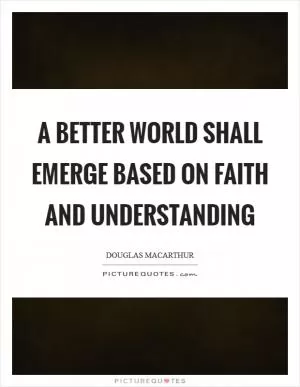No man is entitled to the blessings of freedom unless he be vigilant in it's preservation

No man is entitled to the blessings of freedom unless he be vigilant in it's preservation
Douglas MacArthur, a highly decorated American general and military leader, understood the importance of vigilance in preserving freedom. Throughout his career, MacArthur demonstrated a deep commitment to defending the principles of democracy and liberty, both at home and abroad. His famous quote, "No man is entitled to the blessings of freedom unless he be vigilant in its preservation," encapsulates his belief that freedom is not a given right, but rather a precious gift that must be safeguarded through constant vigilance and dedication.MacArthur's military career was marked by his unwavering dedication to upholding the values of freedom and democracy. As a young officer, he served in World War I and later rose to prominence during World War II, where he played a key role in the Allied victory in the Pacific. MacArthur's leadership and strategic vision were instrumental in defeating the Axis powers and securing peace in the region.
After the war, MacArthur was appointed as the Supreme Commander of the Allied Powers in Japan, where he oversaw the country's reconstruction and democratization. He implemented sweeping reforms that laid the foundation for Japan's transformation into a modern, democratic nation. MacArthur's commitment to promoting freedom and democracy in Japan earned him widespread acclaim and solidified his reputation as a champion of liberty.
Throughout his career, MacArthur understood that freedom is not a static concept, but rather a dynamic and fragile ideal that must be constantly defended. He believed that the blessings of freedom could only be enjoyed by those who were willing to fight for it and remain vigilant against threats to its preservation. MacArthur's words serve as a powerful reminder that freedom is a precious gift that must be cherished and protected by all who value it.












 Friendship Quotes
Friendship Quotes Love Quotes
Love Quotes Life Quotes
Life Quotes Funny Quotes
Funny Quotes Motivational Quotes
Motivational Quotes Inspirational Quotes
Inspirational Quotes